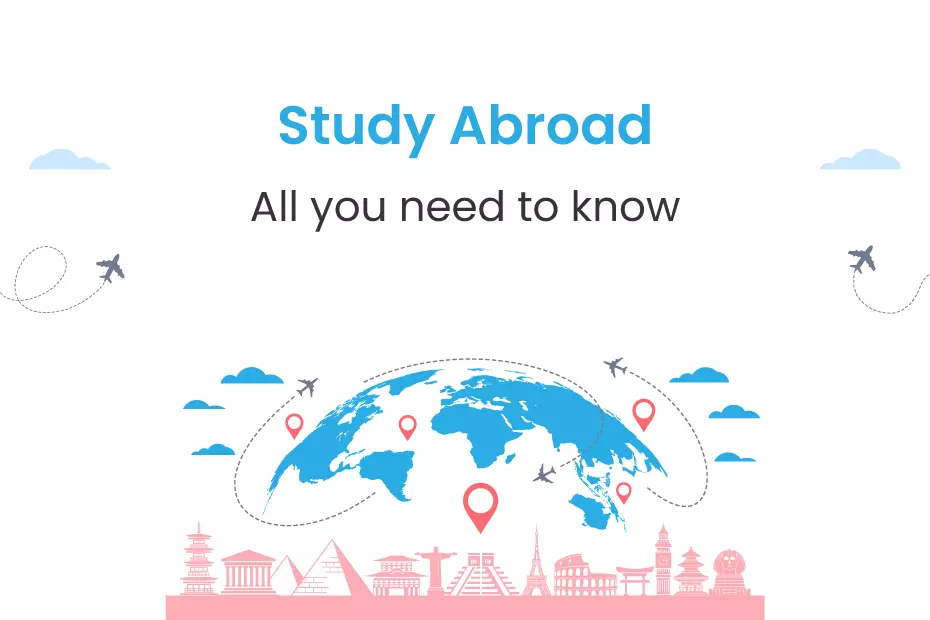Are you thinking about studying abroad? Take a look at some of the universities that are ideal for aspiring immigrants searching for a fresh start away from home. Studying abroad can provide access to a plethora of opportunities.
Many people who travel and relocate abroad first spend time studying abroad. Going to a foreign institution presents several options, including the potential to develop your critical thinking abilities and obtain a degree while doing so, as well as the possibility to discover a new culture.
In today’s globalized industries, exposure to a foreign environment is highly valued, thus it’s advantageous to list the time spent studying abroad on your resume.
The possibilities to study abroad are endless when it comes to educational programs offered around the world; it’s important to select the right course before investing time and money. Here are some points to consider if studying abroad is your dream.
- What do you want to study abroad?
- Where do you want to be studying abroad?
- Countries to consider
- Tuition fees for International students
- Learning the local language
What Do You Want to Study Abroad?
To maximize the return on your investment, your selected study program needs to achieve your goal. How you define your goals is up to you; your main goal could be acquiring new skills, advancing your career, or changing your career course.
The first and most important issue to address is what you plan to get out of it:
- Do you want to improve your credentials within your current field?
- Are you aiming to attain the right credentials to move into a new field of work? Or do you want to try something completely unrelated to your career, but in which you’ve always had an interest?
Whether you’re looking at art, history or econometrics, any degree that you follow is important to you; in fact, that’s the only metric that matters.
For many professionals, in particular, the idea of putting a career on hold to pursue another degree isn’t exactly the best. To that end, universities offer executive degrees and international MBA programs, which offer more practical training for budding entrepreneurs and keen negotiators.
These kinds of programs are significantly easier to afford with a few years of salaried employment under your belt, and will hopefully lead to some career advancement, as well.
Where Do You Want To Study Abroad?
Moving abroad to pursue your academic dream is one of the most enriching decisions that you could ever make; that’s why choosing the right country is crucial.
Where you choose to study abroad could have a profound effect on your career path. Several things should factor into your choice of where to apply:
- Moving somewhere where you speak the language: being able to communicate with locals as soon as they arrive is crucial. Even if you’re a Brazilian moving to Portugal, there are still differences that could trigger culture shock. Not everyone worries about this, though; learning a new language helps you navigate a new culture.
- Pick a country that satisfies your curiosity and consider a school with language courses.
- Choosing a study program in a language that works for your career: Most universities offer at least a few programs in English, especially at the postgraduate level. If you foresee yourself working in a Spanish-speaking country and feel confident about your ability to work in Spanish, consider programs that equip you with the theory in Spanish.
- Ensure that you can balance your studies with your life: Students moving abroad generally want to enrol as full-time students. Many students, however, balance their studies with a career or a family. If you need to study part-time, make sure the school permits or encourages this before you apply.
- Make sure your education leads towards the career you want: Following a study program that doesn’t help you realize your career goals could set you back. Education is a major investment of time and money, especially if you’re paying international tuition fees. While it might be fun to study film history, it won’t equip you for success as a financial analyst.
Countries To Consider
Each country’s post-secondary educational systems have its advantages, disadvantages, and quirks. Here are a few countries worth investigating as options for furthering your education:
- Norweigian universities
- Belgian universities
- Czech Universities
- British universities
- Dutch universities
- French universities
- German universities
- Luxembourgish universities
- Portuguese universities
- Russian universities
- South African universities
- Spanish universities
- Swiss universities
Tuition Fees For International Students
A lot of students come from countries that place an exorbitant price tag on higher education; prospective students from countries like the United States are blown away by the low (or even non-existent) tuition fees for international students in Germany or Norway.
Would You Like To Apply For This Jobs/Sponsorship?
Enter Your Email Address HERE & You Will Receive a Notification About Your Application. If it shows "Subscribed" CLICK HERE to follow on Telegram for updatesThere are 11 countries with no tuition fees for EU/EEA citizens: Austria, Denmark, Finland, France, Germany, Greece, Hungary, Norway, Poland, Slovenia, and Sweden. There are also plenty of countries where, based on the cost of living in your home country, tuition fees and the overall cost of living would make the cost of studying abroad seem quite low.
Studying abroad can sometimes incur high tuition fees. Being an international student incurs high tuition fees in the majority of countries, however. In some cases, this is because tuition fees are aggressively high (e.g., in the United States, and the United Kingdom); in others, this is because international student fees are set quite high to subsidize lower fees for local students.
No matter what the reason, high tuition fees require some extra planning. Plan out how your savings or family contributions will cover your costs. If your employer is helping you pursue a business or executive degree, confirm the level of support that they’re willing to offer and what conditions they place on their financial support.
Most universities have at least a handful of scholarships or grants specifically for international students. Hot campus News provides information on scholarships, while the European Commission also offers information on scholarships and Erasmus programs in European countries.
Learning The Local Language
Your academic program should be your primary focus while studying abroad, but school isn’t the only place where you’ll be learning as an international student. Learning a new language enriches your everyday life, improves your understanding of the local culture, and can also boost your career opportunities after your studies are over.
In many cases, universities or local municipal governments provide heavily discounted language classes for recent immigrants; take as many as you can afford, both in terms of your budget and also your time.
Learning the local language is just one of the many enriching parts of studying abroad. Aside from these official sources, there is a wide variety of cultural centres and organizations promoting different cultures and the languages associated with them.
Many of these organizations have offices around the world to help people learn the language abroad; they often also organize language classes in the country itself, too. Look up a local chapter of one of these cultural promotion organizations to get started:
- Czech: Czech Centers
- French: Alliance Française
- German: Goethe-Institut
- Greek: Center for the Greek Language
- Hungarian: Balassi Institute
- Italian: Società Dante Alighieri
- Japanese: Japan Foundation
- Korean: King Sejong Institute
- Mandarin: Taiwan Academy or Confucius Institute
- Portuguese: Instituto Camões
- Romanian: Institutul Cultural Român
- Russian: Russkiy Mir Foundation
- Spanish: Cervantes Institute
- Swedish: Swedish Institute
- Turkish: Yunus Emre Enstitüsü
If you plan on making a long-term move, learning the language is a pragmatic choice as well as a respectful one. Many students find the transition from student life to career path a difficult one; being able to communicate in the local language will ease the process if that’s your end goal.
Conclusion
It isn’t easy moving to a new country on your own to follow a career opportunity, let alone moving abroad to pursue your academic goals. Universities are diverse places by nature; you’ll have no shortage of fellow foreigners to befriend as you navigate an entirely new culture.
Aim to be as active as your studies allow participate in a student association, go to pub nights for students from your country, or join a sports club. Having a wide variety of social activities to complement your studies will help you land on your feet and build social networks that can support you when you need them.






